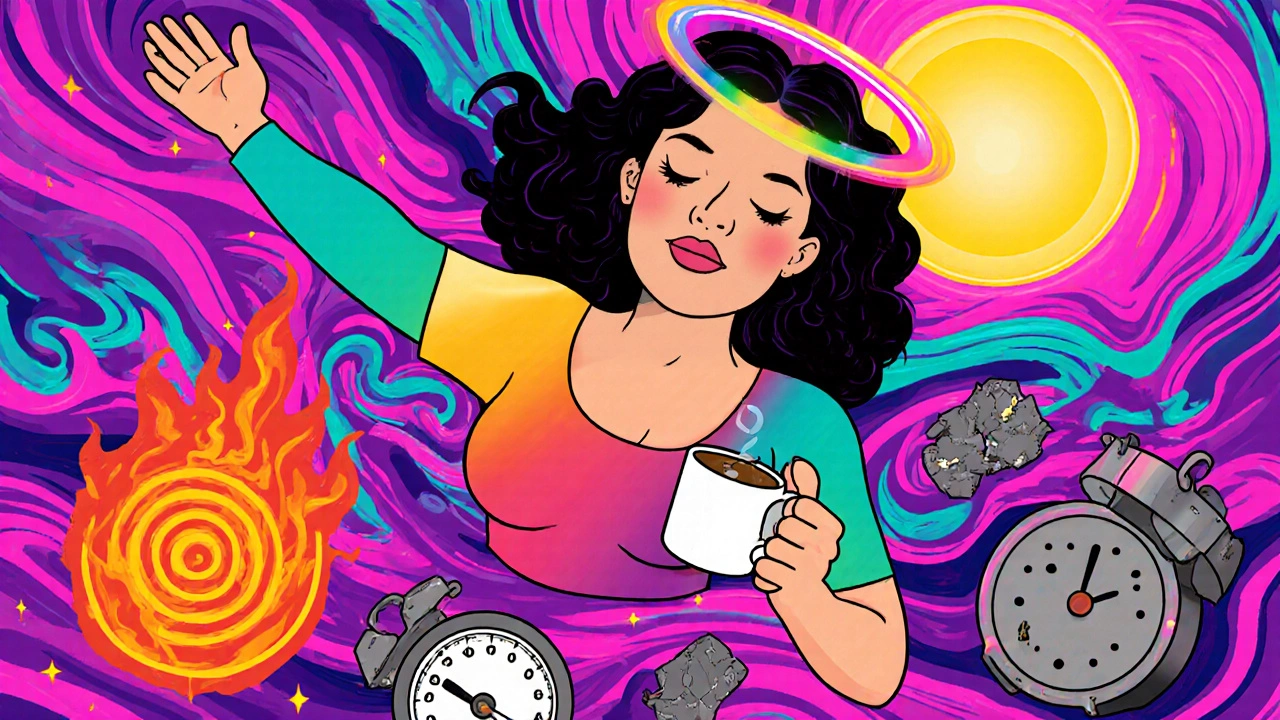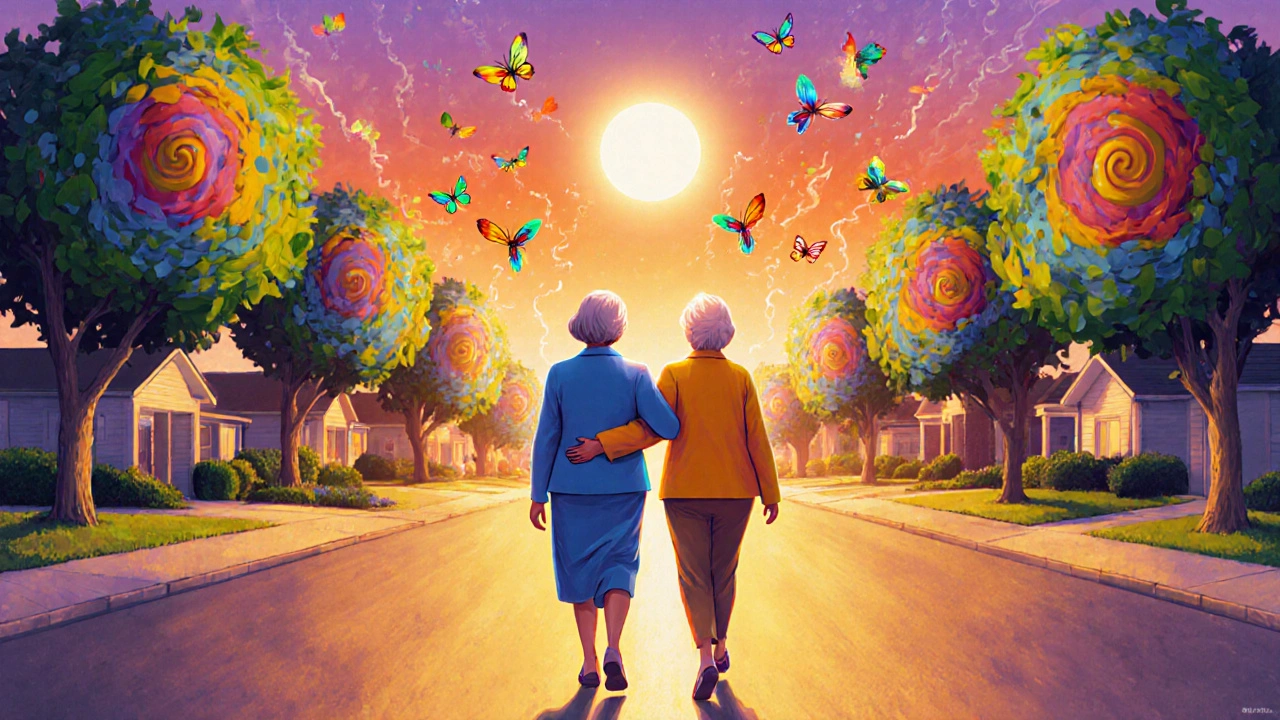How Menopause Drains Your Energy and What You Can Do About It

Ever wake up after eight hours of sleep and still feel like you’ve run a marathon? If you’re in your late 40s or early 50s, that crushing tiredness isn’t just stress or bad sleep-it’s menopause. Your body is shifting hormones, and energy levels are one of the first things to drop. This isn’t normal aging. It’s a biological reset, and it’s more common than you think. Around 80% of women going through menopause report persistent fatigue, according to the North American Menopause Society. It’s not just in your head. It’s in your cells.
Why Your Energy Crashes During Menopause
Your ovaries are slowing down. That means estrogen and progesterone levels are dropping, and your body doesn’t know how to adjust. Estrogen doesn’t just affect your period-it helps regulate your metabolism, your sleep cycles, and how your muscles use fuel. When estrogen dips, your body burns energy less efficiently. You might not gain weight right away, but you’ll feel drained faster.
Progesterone is another key player. It’s a natural calming hormone that helps you fall asleep. When it drops, sleep gets broken. You wake up at 3 a.m. with a racing heart, then struggle to get back down. Even if you sleep seven hours, if half of it is light or interrupted, your body never hits deep restorative sleep. That’s why you feel exhausted even after a full night.
Thyroid function also gets tangled in this mess. Many women develop mild hypothyroidism during perimenopause. Your thyroid slows down, which directly lowers your metabolic rate. You might not notice weight gain, but you’ll notice you can’t push through your afternoon meeting without coffee-or three.
It’s Not Just Sleep-It’s Blood Sugar and Inflammation Too
Menopause doesn’t just mess with hormones. It changes how your body handles sugar. Lower estrogen means your muscles become less sensitive to insulin. That causes blood sugar spikes and crashes. You eat a banana for a quick energy boost, but 90 minutes later, you’re crashing harder than before. That’s why snacks like granola bars or fruit juice often backfire-they give you a sugar rush, then a crash that feels like a wall.
Chronic low-grade inflammation is another hidden culprit. As estrogen drops, your body produces more inflammatory markers. This isn’t the kind of inflammation that makes your knee swell. It’s the quiet, constant kind that makes every cell feel sluggish. Think of it like rust in your engine. You’re still running, but everything’s slower, heavier, and harder to keep going.
Hot Flashes Are Energy Stealers Too
That sudden rush of heat, drenching sweat, and heart pounding? It’s not just uncomfortable-it’s exhausting. Each hot flash triggers your sympathetic nervous system. Your body goes into fight-or-flight mode, releasing adrenaline and cortisol. That’s fine for escaping a bear. Not fine for 10 times a day. Each episode burns calories, raises your heart rate, and floods your system with stress chemicals. By lunchtime, you’ve already used up half your daily energy budget.
And then there’s night sweats. You wake up soaked, change sheets, maybe drink water, and try to go back to sleep. But your core temperature is still elevated. Your body can’t cool down enough to enter deep sleep. Over weeks and months, this adds up. You’re not losing sleep-you’re losing recovery.

What Actually Works to Bring Your Energy Back
There’s no magic pill, but there are proven ways to rebuild your energy. Start with movement-not intense workouts, but consistent, gentle activity. Walking 30 minutes a day, five days a week, improves mitochondrial function. That’s the part of your cells that makes energy. A 2023 study in the journal Menopause found that women who walked daily reported 40% less fatigue after 12 weeks.
Strength training matters too. Muscle mass drops during menopause, and muscle is your body’s main energy reservoir. Lifting weights-even light dumbbells twice a week-helps your body use glucose better and keeps your metabolism from slowing. You don’t need to bulk up. You just need to stay strong.
Food is your next tool. Skip the processed snacks. Focus on protein at every meal. Eggs, tofu, lentils, chicken, Greek yogurt. Protein stabilizes blood sugar and keeps you full longer. Pair it with healthy fats-avocado, nuts, olive oil. These fats help your body absorb hormones and reduce inflammation.
Hydration is non-negotiable. Dehydration feels like fatigue. Drink water before coffee. Aim for 2 liters a day. If you’re sweating a lot from hot flashes, you need even more.
Supplements That Actually Help (and the Ones That Don’t)
Some supplements have real data behind them. Black cohosh has been shown in multiple studies to reduce hot flashes and improve sleep quality. Magnesium glycinate helps calm your nervous system and improves deep sleep. Vitamin D deficiency is common in menopausal women-and low D is linked to fatigue. Get your levels checked. If you’re below 75 nmol/L, supplementing 1,000-2,000 IU daily helps.
Don’t waste money on “menopause energy boosters” full of caffeine, guarana, or synthetic herbs. They give you a quick spike, then a crash that leaves you worse off. And avoid high-dose soy isoflavones unless your doctor recommends them. They can help some women, but trigger hot flashes in others.

When to See a Doctor
Not all fatigue is menopause. If you’re also experiencing unexplained weight gain, cold intolerance, constipation, or brain fog that doesn’t improve, get your thyroid checked. A simple TSH blood test can rule out hypothyroidism, which is common in this age group.
If your energy is so low you’re skipping work, canceling plans, or crying from exhaustion, talk to your doctor about hormone therapy. Bioidentical or low-dose estrogen therapy can restore energy in many women-especially if hot flashes and sleep disruption are the main issues. It’s not for everyone, but for those who qualify, it’s life-changing.
Real Life: What Works for Women in Perth
One woman I spoke with, Linda, 52, from Fremantle, started waking up at 2 a.m. every night. She’d scroll on her phone until 4, then drag herself to work. She felt like a ghost. She tried melatonin. It didn’t help. Then she started walking with a friend every morning before work. No phone. Just sunlight and conversation. Within three weeks, her sleep improved. She stopped needing afternoon naps. She didn’t take a pill. She just moved and connected.
Another, Maria, 49, from Subiaco, swapped her midday croissant for a boiled egg and a handful of almonds. She cut out sugary lattes. Within two weeks, her energy crashes vanished. She didn’t lose weight. But she stopped feeling like she was running on empty.
It’s not about drastic changes. It’s about stacking small, smart habits. Movement. Protein. Hydration. Sleep hygiene. These aren’t trendy fixes. They’re biological necessities your body is screaming for.
You’re Not Lazy. You’re Changing.
Menopause doesn’t mean your energy is gone forever. It means your body is asking for a new setup. The old rules don’t work anymore. You can’t push through with caffeine and willpower. You need to rebuild from the inside out.
It’s okay to slow down. It’s okay to say no. It’s okay to rest without guilt. Your body isn’t breaking down-it’s upgrading. And with the right support, your energy will come back. Not the way it was before. But better. Quieter. More sustainable. More yours.
Why am I so tired all the time during menopause?
Your estrogen and progesterone levels are dropping, which disrupts sleep, slows your metabolism, and causes blood sugar swings. Hot flashes and night sweats also drain energy by triggering stress responses. Fatigue during menopause isn’t just in your head-it’s a biological shift.
Can hormone therapy help with menopause fatigue?
Yes, for many women. Low-dose estrogen therapy, especially when hot flashes and sleep disruption are the main issues, can significantly improve energy levels. It helps stabilize body temperature, improve sleep quality, and restore metabolic balance. Talk to your doctor about whether it’s right for you based on your health history.
Does exercise really help with menopause fatigue?
Absolutely. Regular walking, strength training, and gentle movement improve mitochondrial function-the part of your cells that makes energy. A 2023 study showed women who walked 30 minutes a day, five days a week, reported 40% less fatigue after 12 weeks. You don’t need to run marathons. Just move consistently.
What foods should I eat to boost energy during menopause?
Focus on protein at every meal-eggs, tofu, lentils, chicken, Greek yogurt. Pair with healthy fats like avocado, nuts, and olive oil. These stabilize blood sugar and reduce inflammation. Avoid sugary snacks and refined carbs-they cause energy crashes. Stay hydrated with 2 liters of water daily.
Are supplements like black cohosh or magnesium helpful?
Black cohosh has been shown in studies to reduce hot flashes and improve sleep. Magnesium glycinate helps calm your nervous system and supports deep sleep. Vitamin D deficiency is common and linked to fatigue-get tested and supplement if needed. Avoid energy-boosting supplements with caffeine or synthetic herbs-they cause crashes.
When should I get my thyroid checked?
If you’re experiencing fatigue along with cold intolerance, weight gain, constipation, or brain fog that doesn’t improve with lifestyle changes, get a TSH blood test. Hypothyroidism is common during menopause and can mimic or worsen menopausal fatigue. Treating it can restore your energy quickly.
kim pu
November 20, 2025 AT 02:35so like... estrogen is just a *vibe*? lol. my dog has more hormonal regulation than me. they say 'biological reset' like it's a software update. nah. it's a system crash with no backup. and why is everyone acting like walking is magic? i walk 10k steps daily and still feel like i'm dragging a fridge uphill. also-who approved this article? it reads like a wellness influencer’s fever dream with footnotes.
malik recoba
November 21, 2025 AT 22:03i just wanted to say this made me feel seen. i’ve been so tired for years and thought i was just lazy. turns out my body’s just doing its thing. i started eating eggs for breakfast and drinking more water. small stuff. but i sleep better now. thanks for writing this. you’re not alone.
Sarbjit Singh
November 23, 2025 AT 14:48brothers and sisters, this is the real deal. i’ve been through this with my wife. walking, protein, magnesium-yes yes yes. no magic pills, just real life. you got this. 🙏
Angela J
November 23, 2025 AT 22:24ok but have you considered that menopause is just a cover-up for the government’s secret bio-weapons program? they’ve been spraying estrogen disruptors in the water since 2012. the CDC won’t tell you. big pharma is making billions off your fatigue. i know someone who took black cohosh and her hair turned green. it’s not coincidence.
Sameer Tawde
November 25, 2025 AT 19:30Move. Eat protein. Hydrate. Sleep hygiene. That’s it. No fluff. Just biology. Do the basics. Consistently. You’ll feel better.
Erica Lundy
November 26, 2025 AT 09:01The metaphysical implications of hormonal flux as a systemic recalibration of embodied temporality are profound. One might argue that the fatigue is not a deficit, but an epistemological recalibration-a surrender to the ontological weight of biological impermanence. The body, in its quiet rebellion, is not failing; it is reorienting toward a more sustainable phenomenology of being. To resist this is to cling to a Cartesian illusion of the self as machine. Perhaps the exhaustion is the soul’s way of whispering: ‘Slow down. You were never meant to run forever.’
Kevin Jones
November 27, 2025 AT 05:11Estrogen isn’t just a hormone-it’s the CEO of your cellular Fortune 500. When she quits? Chaos. Mitochondria go on strike. Glucose riots. Inflammation throws a rave in your synapses. This isn’t menopause. It’s a corporate hostile takeover-and your body’s the boardroom.
Premanka Goswami
November 28, 2025 AT 02:47they say 'natural' but who defines natural? the FDA? the WHO? the same people who told us trans fats were healthy? menopause is a corporate lie to sell you collagen powder and soy lattes. your body isn't broken-it's being manipulated. they want you dependent. don't fall for it. the truth is buried under 12 layers of wellness marketing.
Alexis Paredes Gallego
November 29, 2025 AT 21:36THIS IS A CO-ORDINATED ATTACK. I read this and I swear I saw a shadowy figure in the background of the Perth woman’s photo. Linda? Maria? They’re plants. Paid by Big Hormone. They want you to believe walking helps. But what if your fatigue is caused by 5G frequencies syncing with your pineal gland? And the ‘hot flashes’? That’s not your body-it’s a microwave signal from a satellite. They’re draining your energy to power the AI. Wake up.
Saket Sharma
November 30, 2025 AT 02:09Walking? Protein? Please. You’re treating symptoms, not the root. The real issue? Glyphosate in your food. Endocrine disruptors in your shampoo. Your body is detoxing. You’re not tired-you’re purging. Take diatomaceous earth. Do cold plunges. Stop listening to influencers. The system is rigged. You’re not broken. You’re being purified.
Shravan Jain
December 1, 2025 AT 18:35Let me be blunt: this article is a glorified blog post with a few citations and zero peer-reviewed meta-analyses. ‘2 liters of water’? That’s not medical advice-it’s a slogan. And black cohosh? The only thing it’s proven to reduce is your bank account. The real solution? Hormone therapy. But only if you’re white, middle-class, and have insurance. For the rest? You’re on your own. Thanks for the platitudes.
Brandon Lowi
December 3, 2025 AT 09:42AMERICA ISN’T READY FOR THIS. Menopause? It’s not a woman’s issue-it’s a national security threat. Our workforce is crumbling because the left won’t admit that biology is real. They call it ‘gender-affirming care’-but what about our mothers? Our grandmothers? They’re being erased by woke wellness culture. I’m not saying hormones are the answer-I’m saying we need to stop pretending this is ‘empowerment.’ It’s decline. And we need to fight it-with steak, strength, and silence.
Joshua Casella
December 4, 2025 AT 20:00Malik’s comment hit me right in the chest. I’ve been there. I started meal prepping chicken and broccoli on Sundays. Took my dog for walks at sunrise. No phone. Just air. Took 6 weeks. But now? I’m not ‘fixed.’ I’m just… present. That’s enough. If you’re reading this-you’re already doing better than you think.
Richard Couron
December 6, 2025 AT 00:37They say ‘you’re not lazy’-but what if you are? What if your body’s just telling you: ‘You’re not built for this anymore.’ Maybe the answer isn’t more protein. Maybe it’s less guilt. Less hustle. Less pretending you’re 30. Maybe the real power is in saying: ‘I’m done. I need to rest.’ And that’s not weakness. That’s wisdom. And if the system doesn’t like it? Let it burn.